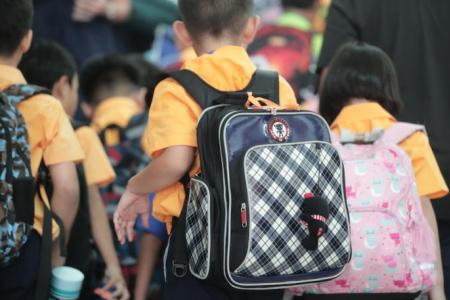Schools adapt as Omicron hits students, teachers and staff
When Ms Lin Chan's eight-year-old son's mother tongue teacher was quarantined in February this year after contracting Covid-19, his class had several stand-in teachers, some of whom could not teach Chinese.
Ms Chan, 40, said it was not the only time her son's class had to rely on relief teachers because of the pandemic. Since July last year, three or four of his teachers have had to miss school after being issued stay-home notices, she said.
"It is disruptive, but there is no choice," said Ms Chan, a special-needs education consultant and trainer.
The infectious Omicron variant has not spared schools, with students, teachers and other staff hit by the virus.
Ms Liew Wei Li, deputy director-general of education for schools and director of schools at the Ministry of Education (MOE), said that in the first two months of this year, fewer than one in 10 teachers tested positive for Covid-19.
This would number in the hundreds, given that there were about 15,600 teachers in Singapore's schools in 2020.
Ms Liew said teachers who test positive for Covid-19 have to self-isolate for 72 hours. They can return to school after testing negative on an antigen rapid test (ART) at the end of the 72 hours.
Children have been particularly susceptible to Omicron. About 27,000 children have contracted Covid-19 since December last year, when the first locally transmitted Omicron case was reported, the Ministry of Health (MOH) said on Feb 28.
According to MOE guidelines, students who are well but have obtained a positive Covid-19 test result should self-isolate at home for 72 hours before doing a second ART. They can return to school if that ART is negative and they feel well.
Ms Liew said schools engage relief teachers to cover the duties of teachers who have Covid-19. MOE has also deployed headquarters officers to support schools.
The ministry added that schools monitor the number of Covid-19 cases closely and may implement home-based learning as a precaution.
Schools have also had to adapt when other staff fall ill. The Straits Times understands that in February, the canteen at Nan Hua High School in Clementi was closed for around five days after several stallholders tested positive. The school catered food for students who could not bring their own meals during the closure.
A teacher at a primary school in the west, who only wanted to be known as Ms Tan, said the recent surge in Covid-19 cases has drastically increased her workload.
The teacher of 11 years said that over the past few weeks, four or five pupils in her two classes have missed school every week after coming down with Covid-19. This creates a large amount of administrative work for her as she has to report their cases to her school management, as well as rush to prepare materials for them to study at home if they are able to, on top of her regular work, she said.
She added that about 20 of her roughly 100 colleagues have also caught the virus and missed school over the last few weeks, which has added to her teaching load.
"I'm constantly having to keep track of who is Covid-19-positive and who is vaccinated, and other things like that," she said. "I don't think this should be part of a primary school teacher's work."
Based on interviews with several parents, different schools appear to have different processes related to Covid-19.
Ms Chan said pupils at her son's school, which is in the east, have been asked to take an ART before attending school on Mondays whenever national cases spike. This has happened around five times, she said.
When students show symptoms of Covid-19, they are also sent home to do a test, she said, adding that she appreciated the precautions the school takes.
Ms Charlotte Lee, 41, a project manager who has three sons aged 12, 10 and seven, said that at her sons' school, all classmates of an infected student are issued health risk notices by MOH. This means they have to take an ART test every day for five days.
Finance manager Alan Tan, 40, said that when his seven-year-old son tested positive for the virus last month, all his classmates at Xinmin Primary School in Hougang were put on home-based learning for a week.
The school gave clear instructions to parents via message groups, as well as on Parents Gateway, an online portal for parents and schools to communicate with each other.
But Mr Roger Poh, 52, whose two daughters aged 14 and 15 are in different secondary schools, said the schools did not inform him when the girls' classmates tested positive.
"When the Covid-19 cases were low back in October and pre-Omicron, we were kept informed via Parents Gateway. But after that, there have not been any updates," he said.
Mr Poh, who works in business development, added: "But I have no major issues with it. The schools are doing a good job, given their constraints and not wanting to alarm parents."
Schools continue to enforce measures to limit the spread of Covid-19.
MOE has aligned schools' cleaning protocols with MOH and the National Environment Agency's latest guidelines. This means deep cleaning and disinfection are no longer necessary if the school has an existing cleaning regime.
Ms Chan said she was concerned that teachers have to handle Covid-19 issues along with their regular work.
"Teachers are giving out their cellphone numbers so that parents can provide their children's Covid-19 test results. This is very inefficient, if you ask me," she said. "They become like MOH officers."
Ms Liew said the ministry recognises the "exceptional demands that Covid-19 has placed on the entire education system, and our teachers, in particular, have to shoulder many more duties to keep schools safe while still ensuring learning continues for our students". She added that the ministry has resources to support teachers' well-being.
Ms Lee, like the other parents interviewed, said she appreciated the work the schools and teachers are putting in.
However, with measures such as the closure of most play areas and the restriction of sports in big groups still in place, she is hoping for a return to regular school activities soon.
"Children need to interact and have fun," she said. "The measures are really restrictive. I do not think they are good in the long term."
Get The New Paper on your phone with the free TNP app. Download from the Apple App Store or Google Play Store now



